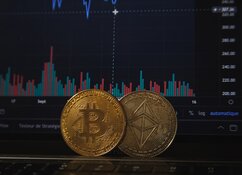The stock for Beyond Meat Inc. (BYND:NASDAQ) has experienced a dramatic rise, soaring from a low of US$0.50 per share to a high of US$7.69, marking an astonishing 1,438% increase, reported Rich Duprey for 24/7 Wall St. on October 23.
The rapid ascent was driven by several factors: its inclusion in the Roundhill Meme Stock ETF (NYSEARCA:MEME), an expanded partnership with Walmart Inc. (WMT:NYSE) to offer a new Beyond Burger 6-pack in over 2,000 stores, and recognition from Bank of America as a Reddit meme stock to watch, the article said.
The primary catalyst, however, was a classic short squeeze, where high short interest forced sellers to cover positions, intensifying the rally, he said.
The recent surge in Beyond Meat’s stock price mirrors the wild fluctuations of meme stocks like AMC Entertainment Holdings Inc. (AMC:NYSE) and GameStop Corp. (GME:NYSE), according to Duprey.
"These rallies thrive on social media hype, often detached from a company’s fundamentals," he wrote. "For BYND, the inclusion in the Roundhill Meme Stock ETF capitalized on online buzz, not operational success. Similarly, Bank of America’s watchlist mention echoes 2021’s volatility, when BYND soared before crashing 47% by year-end. These catalysts are fleeting, offering no lasting value. The Walmart partnership, while seemingly positive, doesn’t address the core issue: declining demand for plant-based meat."
The author continued, "Investors chasing these short-term triggers risk buying at inflated prices, only to face steep losses when the momentum fades, as history shows with other meme stock corrections."
Creating a Surge in Demand to Push Up Prices
The meme-stock craze, which emerged during the pandemic, involves large groups of investors coordinating on social media platforms like Reddit to purchase shares in certain companies, often those facing difficulties, according to a piece by Sean Craig on Yahoo! Finance on October 27.
The goal isn't necessarily to bet on a turnaround but to create a surge in demand that drives up stock prices, Craig wrote. This forces short-sellers to buy back shares to cover their positions, pushing prices even higher. However, these surges can collapse just as quickly because there's no underlying business value sustaining the demand. GameStop and AMC were the most notable examples of meme stocks during their peak in 2021, with the London-based hedge fund White Square Capital famously shutting down after suffering losses from shorting GameStop. Similarly, New York City hedge fund Melvin Capital, which also faced significant losses from shorting GameStop, closed in 2022 following that year's market downturn.
Beyond Meat was another stock targeted during that time, making a dramatic return to meme-stock status last week. Its shares had plummeted to record lows earlier this month, just above 50 cents, after the struggling company announced a debt swap agreement with creditors that would significantly dilute existing shareholders. Meme-stock traders saw an opportunity and jumped in, driving the stock to a peak gain of 1,300% during Wednesday's trading. However, the frenzy was as brief as it was intense:
- Citigroup analysts noted that retail investors made up 16% of single-stock trading volume on Tuesday, the highest level recorded since 2018.
- By Friday's close, Beyond Meat shares were up only 267% over the previous five days, having surrendered nearly all of their peak gains.
Beyond Meat reported a 20% decline in revenue year-over-year in its latest quarter, indicating that this rally wasn't driven by fundamentals. In fact, despite the meme-driven spikes, the stock has declined overall this year. Prior to this, it fell for four consecutive years: by 47% in 2021, 81% in 2022, 27% in 2023, and 57% in 2024, according to the report.
Expert: Anything Is Possible for Stock
Given Beyond Meat's current momentum, anything is possible for Beyond Meat in the short term, wrote Jeremy Bowman for Motley Fool on October 26.
Parabolic increases, especially in meme stocks, tend to attract more investors as the stock rises. Some investors on platforms like X and Reddit are calling for the stock to return to its earlier highs when the share price was in the triple digits shortly after its IPO, when sales were booming before the pandemic.
"On some brokerages, the stock, which had about 54% of its float sold short at the end of September, is no longer available to borrow to short," Bowman wrote. "Meme traders are hopeful that the gains will force short sellers like Ken Griffin's Citadel to cover. Many of the new Beyond Meat bulls see the event as a repeat of the GameStop short squeeze, which kicked off the meme stock run."
However, Beyond Meat's fundamentals remain weak, even after the removal of the convertible debt, he noted. Unlike fellow meme stock Opendoor Technologies Inc. (OPEN:NASDAQ), which could benefit from an improving housing market, there isn't a macroeconomic shift that would favor Beyond Meat. People have tried the product by now and have generally decided they don't want to continue buying it. The company is experiencing declining revenue and continues to lose money. In the second quarter, its revenue fell 19.6% to US$75 million.
Despite those statistics, Bowman wrote, "It's possible that Beyond Meat could make a few millionaires in the current rally, especially those who get lucky with options, but it's likely to leave more investors burned."
However, on Monday, in after-hours trading, Yahoo Finance reports that Beyond Meat shares had dropped close to 15%, Shanthi M wrote for Stocktwits on October 27.
"The Motley Fool Stock Advisor analyst team just identified what they believe are the 10 best stocks for investors to buy now … and Beyond Meat wasn't one of them," the article noted. "The 10 stocks that made the cut could produce monster returns in the coming years. Consider when Netflix Inc. (NFLX:NASDAQ) made this list on December 17, 2004 ... if you invested US$1,000 at the time of our recommendation, you’d have $590,357! Or when Nvidia Corp. (NVDA:NASDAQ) made this list on April 15, 2005... if you invested US$1,000 at the time of our recommendation, you’d have $1,141,748!"
The Catalyst: Increasing Awareness of Health Benefits
The global market for plant-based meat was valued at $US8.5 billion in 2024 and is anticipated to grow from US$10.11 billion in 2025 to US$40.38 billion by 2033, with a compound annual growth rate (CAGR) of 18.9% during the forecast period (2025-2033), according to Straits Research.
"Increasing awareness of the health benefits associated with plant-based diets is a significant market driver," the research firm noted. "Plant-based meats are generally lower in saturated fats and cholesterol compared to animal meat, which can help reduce the risk of heart disease, obesity, and other chronic health conditions."
These products serve as alternatives to animal meat and are made entirely from plants. The core concept is to bypass the use of animals to convert vegetation into meat. Organic products provide the same nutrients as animal meat, including fat, protein, minerals, vitamins, and water.
"Due to technological advancements, the new range of plant-based meat has the same taste, appearance, and texture as animal meat," Strait said. "Even though talks regarding plant-based alternatives have existed for decades, they have only lately gained steam due to the efforts of numerous domestic and international organizations to raise awareness about the advantages of converting to plant-based foods in general. In contrast to animal meat, one of the most important factors in the manufacture of these meat products is the absence of external antibiotics."
Therefore, finding alternatives is crucial to significantly reducing antibiotic use, researchers noted. This shift could potentially prevent future pandemics or other deadly diseases transmitted from animals to humans by eliminating the use of animals in any form or process during food production. Due to the continuous mutation of viruses, most of these diseases lack definitive treatments, making them more lethal and dangerous.
Expert Market Research announced that the vegan food market in total reached around US$277 billion in 2024 and is projected to expand to nearly US$70.85 billion by 2034. The report highlighted three primary factors driving this growth: health awareness, environmental sustainability, and ethical consumption.
The firm observed that plant-based diets attract not only vegans but also "flexitarians and meat-reducers," with part of the momentum attributed to advancements in plant-based food technology and the growing availability of meat and dairy alternatives. Expert Market Research emphasized that "vegan food has transitioned from a niche lifestyle to a mainstream global phenomenon."
Ownership and Share Structure1
About 2% of Beyond Meat is owned by insiders and management, about 2% by strategic corporate entities, and about 22% by institutions. The rest is retail.
Top shareholders include PenderFund Capital Management Ltd. with 6.69%, Wolverine Trading LLC with 4.76, Unprocessed Foods LLC with 2.4%, D.E. Shaw & Co. LP with 2.26%, and Ethan Brown with 1.51%.
Its market cap is US$868.77 million with 397.61 million shares outstanding. It trades in a 52-week range of US$0.50 and US$7.69.
| Want to be the first to know about interesting Special Situations and Technology investment ideas? Sign up to receive the FREE Streetwise Reports' newsletter. | Subscribe |
Important Disclosures:
- Steve Sobek wrote this article for Streetwise Reports LLC and provides services to Streetwise Reports as an employee.
- This article does not constitute investment advice and is not a solicitation for any investment. Streetwise Reports does not render general or specific investment advice and the information on Streetwise Reports should not be considered a recommendation to buy or sell any security. Each reader is encouraged to consult with his or her personal financial adviser and perform their own comprehensive investment research. By opening this page, each reader accepts and agrees to Streetwise Reports' terms of use and full legal disclaimer. Streetwise Reports does not endorse or recommend the business, products, services or securities of any company.
For additional disclosures, please click here.
1. Ownership and Share Structure Information
The information listed above was updated on the date this article was published and was compiled from information from the company and various other data providers.













































